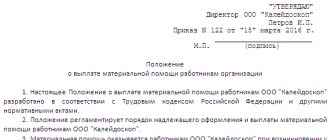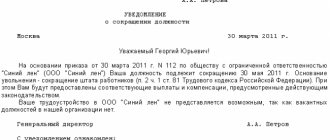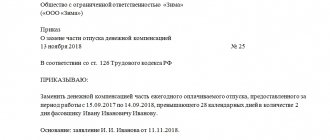Receiving financial assistance upon dismissal: to whom, when and in what amount is it paid?
Upon termination of the employment relationship, the organization must make a final settlement with the dismissed person (return the necessary documents and funds). In addition, financial assistance may be provided upon dismissal. It does not apply to mandatory payments, but can be accrued at the discretion of the organization if certain conditions are met.
Is it paid upon dismissal?
Mat. assistance is a one-time payment paid regardless of the number of hours worked and the qualifications of the employee. Paid on the basis of internal documents regulating labor law. Is financial assistance available upon dismissal?
At your own request
One-time payments are not regulated by the Labor Code of the Russian Federation. Most employers are not interested in such payments if the employee, on his own initiative, decides to terminate the employment relationship. On the other hand, such encouragement may influence the decision of the person leaving to withdraw his application.
Some organizations pay financial assistance to employees who, during the performance of their job duties, have made a significant contribution to its development. When terminating the contract at his own request, the employee can draw up a written request for payment of mat. help.
Moreover, he can indicate its size independently. If the decision is positive, an order will be issued to pay it.
Reasons for issuing financial aid:
- forced dismissal due to caring for a sick relative;
- retirement;
- other conditions reflected in the document regulating labor relations or regulations of the organization.
If the provision of financial assistance is reflected in the company’s regulations or employment contract, then upon dismissal it must be paid.
By agreement of the parties
Termination of an employment contract by agreement of the parties is accompanied by the preparation of a special document. It contains all payments due upon dismissal.
All items are included in the document only with the mutual consent of all employees and employers. If an employee needs financial assistance, he must notify the employer. If he doesn’t mind, they decide on its size.
All information about cash payments and the timing of their provision is indicated in an additional agreement, which must be endorsed by both parties. If it is not reflected in the document, it can only be paid at the request of the director.
Military personnel, civil servants and municipal employees
When a person in military service is dismissed, financial assistance is also paid. Its value is influenced by many factors, including military salary and rank.
Financial assistance is not paid in the following cases:
- deprivation of rank;
- criminal prosecution;
- imposing a suspended sentence of imprisonment;
- expulsion from an educational institution for violation of discipline;
- deprivation of the right to assign military positions by court order;
- non-compliance with the conditions specified in the contract;
- deprivation of access to information related to state secrets;
- failure to pass the tests specified in the contract.
A person working in government agencies can also apply for swearing. assistance with dismissal. However, during his working life, he should not make gross mistakes that lead to negative consequences. The right to receive financial assistance is established in regional regulatory documents. A one-time payment is also possible in the event of special circumstances.
When resigning, a municipal employee can count on monetary incentives only if such payment is specified in the legal acts of the given territory.
The amount is calculated in each case individually.
If there are compelling reasons (illness or death of a close relative), a municipal employee can independently submit an application requesting financial assistance.
Is it possible to receive financial assistance for vacation?
Sometimes organizations provide one-time incentives to their employees. Its size can be fixed or equal to the salary. If an employee is dismissed who has not worked for a full 12 months, the payment of financial assistance remains at the discretion of the head of the organization.
They provide social and incentive assistance. Social has nothing to do with work responsibilities. It does not relate to labor costs, therefore, it is not subject to tax. Provided upon written request from the employee.
Incentive payments are included in labor costs and are therefore subject to taxation. If the amount does not exceed 4,000 rubles, then the payment is not subject to taxation. If it is more than the specified amount, then personal income tax and contributions to insurance companies are paid from it.
The lump sum payment is issued only once a year. The amount can be any, but not more than two months’ salary.
Any employee of the budgetary or non-budgetary sphere has the right to financial assistance upon dismissal. Its amount does not have a fixed amount and is not a mandatory payment.
If an employee was given money before dismissal, then the manager does not have the right to withhold it upon dismissal of the employee. If the amount was withheld during the calculation, the employee can safely go to court to recover it.
Dear readers, the information in the article may be out of date, take advantage of a free consultation by calling: Moscow +7
, St. Petersburg
+7 (812) 309-71-92
or via the feedback form below.
Source: https://prozakon.guru/trudovoe/uvolnenie/materialnaya-pomoshh.html
Is financial assistance returned to vacation upon dismissal?
As current practice shows, many employers include the payment of financial benefits in the terms of the employment contract concluded with the hired employee. The agreement specifically states the grounds under which it is possible to receive financial assistance.
Let us turn to the norms of labor legislation of Russia (Labor Code of the Russian Federation). Article 129 of the Labor Code of the Russian Federation, in addition to wages, workers' compensation includes work incentive payments in the form of various additional payments, allowances, bonuses and other incentives.
It turns out that if the labor agreement or other legal acts in force in the organization stipulate the payment of monetary assistance for certain periods: quarterly or at the end of the year, the practice of paying financial assistance, timed to coincide with the annual leave for the improvement of their employees, is often used in enterprises, such a payment can be considered an integral part of wages.
Financial assistance upon dismissal
Obviously, some of the vacation pay will have to be returned. There are no questions with this. According to the collective agreement, financial assistance in the amount of one employee’s average earnings is provided annually when going on vacation.
Will it be necessary to return financial assistance in case of dismissal? question number No. 2465398 read 5402 times Urgent legal consultation8 free
- In accordance with the Labor Code of the Russian Federation, deductions from wages are made only on the grounds established by law. Article 137.
They demand the return of previously issued financial assistance for vacation
Payment of financial assistance can be stipulated in an employment contract concluded upon hiring or in local documents, for example, a collective agreement of an enterprise. When getting a job, a new employee must be familiar with all legal acts applicable to the enterprise.
If a person experiences significant financial difficulties, for example, when expensive treatment is needed, or the death of close relatives requires funeral expenses, he can apply to the manager with a request to provide financial assistance. To provide monetary assistance, an order is issued indicating the amount to be paid to a specific employee based on the application and the time frame when it must be paid.
The amount of financial assistance is not subject to any taxes.
Do I need to return financial assistance to vacation upon dismissal?
Attention: Upon dismissal, an employee on the last day of his work is entitled to receive:
- wages accrued from the date of the last payments for actually worked hours;
- monetary compensation for unused vacation days, if any remain;
- in case of accrual of bonuses and other incentives (related to production) for a given period.
There is no talk in the Labor Code of the Russian Federation about the payment of financial assistance upon dismissal. At the same time, we note: 1. Financial assistance can be paid upon dismissal at one’s own request:
- in connection with retirement;
- the need for constant care of a close relative (with the appropriate certificate);
- in other cases, when this is provided for by the Collective Agreement, which cannot worsen the rights of employees, but provides for the provision of additional benefits and guarantees.
2.
Important One of the grounds for paying financial assistance under the terms of local regulations in force at the enterprise may be the dismissal of an employee for various reasons, except when he is fired for gross violations of discipline, loss of trust, that is, on the initiative of the manager. Is financial assistance available upon dismissal? If, according to the legal acts adopted by the enterprise, financial assistance is provided, for example, for the results of a certain period (quarter, year), in the event of dismissal of an employee when he has not fully worked for this period, whether to pay him financial assistance or not, the issue is resolved in each organization separately.
Should an employee return the financial assistance received if it is canceled by order?
Wages overpaid to an employee (including in the event of incorrect application of labor legislation or other regulatory legal acts containing labor law norms) cannot be recovered from him, except in the following cases: a calculation error; if the body for consideration of individual labor disputes recognizes the employee’s guilt in failure to comply with labor standards (part three of Article 155 of this Code) or downtime (part three of Article 157 of this Code); if the wages were overpaid to the employee in connection with his unlawful actions established by the court. https://www.consultant.ru/popular/tkrf/14_28.html#p2618 © ConsultantPlus, 1992-2013 Thus, financial assistance is not included in the list of grounds on which deduction can be made. When returning unearned vacation pay upon dismissal in June, part of the amount for 7 months is subject to withholding.
Financial assistance upon dismissal of one's own free will
But in the case when a person writes a resignation letter of his own free will and receives compensation for unused vacation upon calculation, the payment of financial assistance that he would have received if he went on vacation is again at the discretion of the administration and the norms prescribed in local enterprise documents.
It will be legal for a resigning employee to receive financial assistance in direct proportion to the time worked at the enterprise.
So, for example, if financial assistance in the amount of 4,000 rubles is provided for 28 days of vacation, then if upon dismissal he has 14 days of allotted vacation left, financial assistance can be paid in the amount of 2,000 rubles.
Deductions from an employee’s salary to pay off his debt to the employer can be made: to reimburse an unpaid advance issued to the employee on account of wages; to repay an unspent and not returned timely advance payment issued in connection with a business trip or transfer to another job in another area, as well as in other cases; to return amounts overpaid to the employee due to accounting errors, as well as amounts overpaid to the employee, if the body for the consideration of individual labor disputes recognizes the employee’s guilt in failure to comply with labor standards (part three of Article 155 of this Code) or simple work (part three of Article 157 of this Code) Code); upon dismissal of an employee before the end of the working year for which he has already received annual paid leave for unworked vacation days. Labor Code of the Russian Federation. None of the above grounds for retention are suitable for the situation under consideration. There is no accounting error here, since the excess payment did not arise from incorrect calculation of the amounts. Incorrect application of labor legislation or other regulatory legal acts containing labor law norms is not a counting error (Part 4 of Article 137 of the Labor Code of the Russian Federation). It will not be possible to return the financial assistance even if they try to “cancel” it by order of a specific employer. Wages and equivalent payments, pensions, benefits, scholarships, compensation for harm caused to life or health, alimony and other sums of money provided to a citizen as a means of subsistence are not subject to return as unjust enrichment in the absence of dishonesty on his part and counting error (Article 1109 of the Civil Code of the Russian Federation).
In this case, the inclusion of financial assistance for health leave in the Regulations on remuneration essentially means that this assistance is an integral part of wages. That is, the fact that, according to Art.
129 of the Labor Code of the Russian Federation is defined as remuneration for labor depending on the qualifications of the employee, complexity, quantity, quality and conditions of the work performed, as well as compensation payments (additional payments and allowances of a compensatory nature, including for work in conditions deviating from normal, work in special climatic conditions and in territories exposed to radioactive contamination, and other compensation payments) and incentive payments (additional payments and incentive allowances, bonuses and other incentive payments).
Source: https://advocatus54.ru/vozvrashhaetsya-li-materialnaya-pomoshh-k-otpusku-pri-uvolnenii/
Retirement of a civil servant
- agreement between the parties to the service contract;
- expiration of a fixed-term service contract;
- termination of a service contract at the initiative of a civil servant;
- refusal of a civil servant from a civil service position proposed to be filled in connection with a change in the essential terms of the service contract;
- refusal of a civil servant to be transferred to another position in the civil service for health reasons in accordance with a medical report or the absence of such a position in the same public service;
- refusal of a civil servant to be transferred to another locality together with a government agency;
- reductions in civil service positions in government agencies;
- abolition of a government agency;
- inconsistency of a civil servant with the civil service position being filled: for health reasons in accordance with a medical report;
- due to insufficient qualifications confirmed by certification results;
Starting from the new year, the retirement age of civil servants is increasing
Severance pay is paid for one month . Over the next thirty days, such material benefits can be provided if you look for a new job and provide evidence of lack of income to your former employer. It is also allowed to pay severance pay for the third month after dismissal if the citizen registered with the regional employment center within two weeks after the end of his working life and this body did not provide him with a job. Such financial assistance for the second, and even more so for the third months , is provided to persons who have not reached retirement age.
07 Oct 2021 lawurist7 184
Share this post
- Related Posts
- Can a bailiff be arrested?
- Where to submit documents for a trip to Chernobyl in Ryazan
- When to Get Money for Veterans On What Date
- Tax benefits for pensioners in Moscow
Financial assistance upon dismissal
Upon termination of the employment relationship, the organization is obliged to make a full settlement with the employee and issue all necessary documents and funds. Financial assistance upon dismissal can be provided to any employee. This payment is not mandatory, but is additional, therefore it is accrued to the employee only if certain conditions are met.
For military personnel
When a serviceman is discharged, he is provided with financial assistance, the amount of which depends on many factors, including military rank and current salary. A person may be deprived of a monetary payment if:
- is currently at the disposal of the commander;
- was stripped of his rank;
- by a court decision, the serviceman was held accountable in the form of imprisonment;
- the court issued a decision on suspended imprisonment for an act that was committed intentionally;
- was expelled from an educational institution for military personnel due to non-compliance with discipline, poor academic performance or lack of desire to continue further education;
- was deprived of the right to receive military positions for a certain period of time by a court decision;
- the conditions specified in the contract are violated or not fulfilled;
- was deprived of the right to receive information related to state secrets;
- a court decision was made on suspended imprisonment for an act that was committed through negligence;
- did not pass the test for other reasons specified in the contract.
If at least one of the above conditions is present, the serviceman is deprived of the right to receive financial assistance.
Civil servants
If the procedure for dismissing a civil servant is being carried out, then a responsible person must take into account many nuances in order to avoid mistakes that could lead to negative consequences.
A person working in government agencies can apply for financial assistance. This right should be enshrined in regional regulations.
In addition, it is possible to provide a lump sum payment in the presence of special circumstances.
Municipal employees
Upon dismissal of a municipal employee, monetary payment is provided only if it was enshrined in legal acts in the given territory.
Its size is calculated individually. In addition, a cash payment may be provided in the event of special circumstances, for example, in connection with the death of a close relative.
The person must indicate this fact in the appropriate application.
Financial assistance is not a mandatory payment and is provided only at the request of the employer.
However, the employee may send an application to the director requesting a monetary payment.
To receive a positive answer, it is recommended to indicate reasons that will confirm the need to receive financial assistance. The amount of payment is set individually for each employee.
Source: https://u-volnenie.ru/posts/materialnaya-pomoshh-pri-uvolnenii
Financial assistance upon dismissal of an employee
When an employee leaves the company, in accordance with labor legislation, he must be paid the last month's salary, bonus, compensation for unused vacation and other amounts stipulated by the labor or collective agreement. These may include financial assistance upon dismissal. If it is specified in a collective or employment agreement, the employer will be obliged to pay it. Otherwise, this question depends on his desire and financial capabilities.
What is financial assistance for?
There is no concept of “material assistance” in labor legislation. But in Art. 129 of the Labor Code of the Russian Federation, in addition to salary and compensation for special working conditions, incentive and incentive payments are indicated. These include financial assistance.
At the federal level, it is not the responsibility of the employer and is usually not included in the payroll. However, Art. 5 and Art. 8 of the Labor Code of the Russian Federation provides for the possibility of issuing local regulations that complement federal legislation.
Such acts include, among other things, a collective agreement. In addition, the conditions for receiving financial assistance may be specified in the employee’s employment contract.
Finally, it can be issued by the manager at the request of the employee or his immediate superior, even if local regulations do not provide for such payments.
Typically, financial assistance is timed to coincide with some event:
- birth of a child;
- employee's wedding;
- death of a loved one;
- anniversary or reaching retirement age, etc.
Financial assistance can also be issued in connection with a serious illness requiring expensive treatment, force majeure (fire, natural disaster, major theft, etc.) and other situations when an employee needs financial support.
In addition, internal documents may provide for regular cash payments to certain categories of employees (for example, parents of minor children or non-residents). Another option is financial assistance for annual leave. Sometimes such payments become a type of incentive (for example, quarterly or annual bonuses for all employees).
The frequency, size and procedure of payments are usually regulated by the company's internal rules. This can be either a percentage of the salary or a fixed amount. Also, local acts may indicate that an employee has the right to apply for financial assistance for any purpose once a year, and repeated payments remain at the discretion of the employer.
Whether an employer must pay financial assistance depends on whether such a possibility is stipulated in local regulations. For example, if the collective agreement states that the company pays each employee 5 thousand rubles in the event of the death of a close relative.
, then upon the occurrence of this event the company is obliged to pay financial assistance. If the employee refuses to do this, he has the right to go to court. If this is not provided, then the issuance of monetary assistance and its amount remain at the discretion of the manager.
In any case, the amount should not depend on the employee’s qualifications and work achievements.
How to apply for financial assistance
If monetary assistance from the employer is not regular, to receive it you need either an application from the employee or a memo from his immediate supervisor. There are no strict rules for their preparation; documents are drawn up in free form. If the manager makes a positive decision, an order is issued to issue financial assistance.
Application for financial assistance
When the initiator of the issuance of financial assistance is an employee, then in the application he indicates:
- name of the organization and full name of the head;
- Full name and position of the applicant, sometimes it is also required to indicate a personnel number;
- name of the document: “Application for the issuance of financial assistance upon dismissal”;
- the employee’s request to issue financial assistance with justification of the reason;
- desired amount;
- signature and date.
The applicant may also be asked to provide supporting documents. For example, if the dismissal is related to health conditions, a medical report.
Sometimes, in order to issue financial assistance, it is necessary to submit not an application, but a memo. This may be due to internal company rules or the fact that the employee himself cannot or does not want to personally seek help.
The memo states:
- name of the organization and full name of the head;
- Full name and position of the author of the document;
- document name: “Memo”;
- The essence is further stated: which employee requires financial assistance and for what reason;
- desired amount;
- signature and date.
Typically, the author of the memo is the employee’s immediate supervisor. However, another colleague can write it. It is better to clarify with the responsible persons exactly who and how should draw up a document on the issuance of financial assistance. This could be a personnel officer, chief accountant or union leader (if the company has one).
Order for the issuance of financial assistance
The head of the organization reviews the application and makes a decision on issuing financial assistance. If it is positive, an order is issued. There is no unified form; it is drawn up in accordance with the requirements of office work and the internal rules of the company.
The document must contain:
- Name of the organization;
- number and date of compilation;
- information about who receives assistance, on what basis and in what amount;
- order to issue financial assistance;
- the procedure and timing for issuing funds, as well as the responsible person (usually the chief accountant);
- list of documents that are attached to the order;
- signature of the manager and seal of the organization (if any).
Based on this order, the accounting department accrues and issues funds.
Amount of financial assistance
The amount of financial assistance can be a specific amount or a percentage of the salary. If its size is not specified in local regulations, the applicant himself decides how much to ask for. In some cases, for example, when money is needed for treatment, checks and receipts for expenses may be attached to the application.
If financial assistance is of a regular nature (for example, annual additional payments for vacation), and the employee has not yet received them, then the amount is calculated in proportion to the period for which it should be accrued.
Taxation of financial assistance
According to Art. 422 of the Tax Code of the Russian Federation, financial assistance is not subject to taxation in the following cases:
- payments during the year do not exceed 4 thousand rubles. If the amount of payments is larger, then only the portion in excess of the specified amount is taxed;
- financial assistance at the birth of a child, not exceeding 50 thousand rubles;
- financial assistance paid in connection with a natural disaster;
- benefits awarded in connection with the death of a family member.
If the payments are of an incentive nature and are issued regularly, then they are included in the wage fund and all taxes and contributions provided by law are withheld from them.
Last changes
There are no significant changes in legislation on this issue in 2021. Our experts monitor all changes in legislation to provide you with reliable information.
Source: https://lawinfo24.ru/trudovoe-pravo/uvolnenie/materialnaya-pomoshh-pri-uvolnenii
Payments upon dismissal of a civil servant at his own request
The right of a civil servant to receive severance pay upon dismissal depends on the grounds for termination of the service contract, as well as local regulatory documents defining the specifics of remuneration in a government agency. In the article we will look at the criteria under which severance pay is paid to a civil servant upon dismissal, and we will also look at a step-by-step summary of the calculation and payment of benefits upon termination of a service contract with a civil servant.
Severance pay for a civil servant upon dismissal, amount when paid
The procedure for calculating and paying compensation upon dismissal of a civil servant is regulated by the provisions of Law No. 79-FZ “On the Civil Service”.
This law does not contain provisions regarding the right of a civil servant to receive severance pay upon dismissal, but nevertheless contains the conditions under which a municipal employee has the right to receive compensation payments upon dismissal.
Thus, we can come to the conclusion that compensation for civil servants upon dismissal is an analogue of severance pay paid to employees in the general manner in accordance with the Labor Code of the Russian Federation.
Based on Law No. 79-FZ, a civil servant has the right to receive compensation upon dismissal for one of the following reasons:
No.
Dear readers!
We describe typical ways to resolve legal issues, but each case is unique and requires individual legal assistance.
To quickly resolve your problem, we recommend contacting qualified lawyers on our website .
transfer to another position offered by the employer due to the state of health of the civil servant, the service contract is terminated.
We emphasize that the provisions of Law No. 79-FZ define payments upon dismissal of a civil servant as compensation, but not as severance pay. Namely, clause 3.1 of Art.
37 of Law No. 79-FZ contains a requirement for payment of compensation in the amount of 4 months of foreign currency allowance upon dismissal of a civil servant due to the liquidation of a government agency or reduction of government positions. With all this, according to clause 3.1 of Art.
37 of Law No. 79-FZ, severance pay upon dismissal for these reasons is not paid.
Calculation and payment of severance pay to a civil servant upon dismissal - step-by-step instructions
The compensation paid to a civil servant upon dismissal is calculated on the basis of the amount of the actual foreign exchange allowance at the time of termination of the service contract.
The features of calculating and paying compensation to a municipal employee upon dismissal are described below.
Step 1. Determining a civil servant's right to compensation
At the first step, the employer's representative (usually an accountant of a government agency) determines the civil servant's right to receive compensation in accordance with the grounds for dismissal.
The list of grounds for a service contract, in accordance with which benefits are paid to a civil servant, is described in the table above.
If a civil servant is dismissed for general reasons, in which, according to Federal Law No. 79, compensation is not paid, then on the day of termination of the service contract, the employer pays the employee:
- wages for practically worked hours in the current month;
- compensation for unused vacation.
Namely, payment of compensation is not made upon dismissal of one’s own free will, by agreement of the parties, upon termination of an employment contract due to loss of trust and other actions of the employee in terms of violation of official obligations.
Step #2. Calculation of compensation for a civil servant
When calculating severance pay and compensation payments to employees of commercial companies and manufacturing companies, the employer applies the norms of the Labor Code of the Russian Federation, in accordance with which the amount of payment is determined on the basis of average earnings for the billing period - 12 months preceding the month of dismissal.
The calculation of compensation for the dismissal of a civil servant differs significantly from the procedure described. In contrast to the calculation of compensation under the Labor Code of the Russian Federation, the compensation payment upon termination of an employment contract is calculated based on the amount of the actual currency content on the date of dismissal.
When determining the amount of foreign currency allowance for a civil servant, the employer takes into account:
- salary;
- increase for length of service, class;
- additional payment for working conditions, irregular working hours, etc.;
- bonus for honest fulfillment of official obligations.
The formula for calculating compensation for a dismissed civil servant is as follows:
Compensation to a civil servant = Cash Content * Coefficient,
where Money Content is the amount of currency content valid on the date of termination of the service contract; Coefficient – coefficient used in calculating compensation depending on the grounds for dismissal.
The coefficient indicator when calculating compensation upon dismissal of a civil servant is established in the following order:
- Coefficient = 4 – dismissal due to the liquidation of a government agency, layoff, refusal to transfer for health reasons, absence from work due to temporary disability for more than 4 consecutive months;
- Coefficient = 0.5 – termination of a service contract in connection with conscription for military service or on the basis of refusal to transfer to another locality, to another position with significant changes in the criterion of the contract.
Step #3. Payment of wages and compensation upon dismissal of a civil servant
Payment of compensation upon dismissal of a civil servant is made no later than the day of termination of the service contract.
In addition to paying compensation, the employer on the day of dismissal must:
- pay the civil servant wages for time worked and compensation for unused vacation;
- issue the employee with a work book with a notice of dismissal reflected in the document.
Let's look at an example . On October 10, 2021, civil servant Kurochkin was dismissed due to the abolition of a government agency.
The amount of Kurochkin's currency content consists of:
- salary – 19,020 rubles;
- increase for length of service - 4,220 rubles;
- additional payments for irregular working hours – 3,060 rubles.
Source: https://nashy-lgoty.ru/vyplaty-pri-uvolnenii-gossluzhashhego-po/
Supplement to pensions for civil servants for length of service in 2021
In addition to the planned increase in the retirement age and the minimum length of service in the civil service for the next six months, an innovation has appeared in 2021 that obliges public sector employees to work in the civil service for at least a year before leaving to retire in order to receive a long-service pension.
Length of service for civil servants in 2021 2021
Disabled civil servants have the right to receive a disability insurance pension , regardless of age and length of service (minimum length of service - from 1 working day). Civil servants who have been assigned a disability insurance pension can apply for a state long-service pension as an additional payment.
Based on an order to abolish a government agency or to reduce positions in a government agency, the service contract with a civil servant is terminated at the initiative of the employer’s representative. The employee must be notified in writing of the upcoming dismissal at least 2 months in advance.
Financial assistance to a civil servant upon dismissal of his own free will
But in the case when a person writes a resignation letter of his own free will and receives compensation for unused vacation upon calculation, the payment of financial assistance that he would have received if he went on vacation is again at the discretion of the administration and the norms prescribed in local enterprise documents.
It will be legal for a resigning employee to receive financial assistance in direct proportion to the time worked at the enterprise.
So, for example, if financial assistance in the amount of 4,000 rubles is provided for 28 days of vacation, then if upon dismissal he has 14 days of allotted vacation left, financial assistance can be paid in the amount of 2,000 rubles.
Payments upon dismissal of a civil servant (Kurevin L.V.)
statements For example, write: “I ask to terminate the service contract in connection with my enrollment in the 1st year of a full-time master’s degree at the Institute of Culture from September 1, 2021.”
When indicating special grounds for dismissal, the official should confirm them with documents.
In particular, existing health problems can be certified by a doctor’s report, and admission to the institute can be certified by a copy of the enrollment order.
The application is drawn up by hand, it is read to the representative of the organization and signed in his presence. If an official had to work the 14 days required by law, then during this period he has the right to withdraw the submitted application. In this case, dismissal from the civil service will not take place unless another person has already been hired to replace the employee who has changed his mind.
Procedure for dismissal from public service
Attention For example, for a month an employee was paid:
- official salary of a civil servant: 10,000 rubles;
- salary for class rank: 2,000 rubles;
- bonus for length of service + for special conditions of service: 1000 + 10200 rubles;
- cash incentive: 10,000 rubles.
Besides:
- in the previous month he received a vacation payment in the amount of 20,000 rubles;
- a few months before, he received a vacation payment in the amount of 20,000 rubles.
To calculate the average monthly salary, all payments received per month are summed up. To this is added 1/12 of the received payments for vacation or financial assistance, allowances for particularly difficult tasks. Thus, we get the amount: 10,000 + 2,000 + 1,000 + 10,200 + 10,000 = 33,200 + 20,000/12 = 34,867 - this is the monthly maintenance.
Its fourfold amount, paid upon dismissal, is 139,468 rubles.
Sample document: Application for dismissal of a civil servant Order This document, as in the standard case of dismissal, is drawn up in the unified form T-8, or in the form established by the rules of office work in a government agency.
Form of dismissal order (form T-8) Registration of a work book and personal card In the work book of the dismissed person, an entry about dismissal is made, indicating the reason, confirmed by reference to the provisions of the legislative act.
Example of an entry in a work book: Information about the employee’s dismissal is entered into the personal card of a civil servant, indicating the reasons - the entry from the work record is copied.
Payments and compensations What is required? When a government body is reorganized or liquidated, as well as when personnel are reduced, the employee receives compensation in an amount equal to four months' salary. No separate severance pay is provided.
Compensation for unused vacation
When a civil servant is dismissed, he, like any other employee, in accordance with the provisions of Article 127 of the Labor Code, is entitled to payment of monetary compensation for unused vacation days. This norm is separately duplicated in Article 46 79-FZ.
In addition, the employee has the right to receive a cash payment for any number of unused additional days and days over 28 calendar annual leave.
Dear readers, each case is individual. If you want to find out how to solve your particular problem, call :
Or on the website. It's fast and free!
From the date following the date of dismissal, the employee will not receive a salary (his planned accruals will cease), the employee will not be taken into account when generating reports for periods subsequent to the date of dismissal
- in the Grounds for dismissal field, you must select the grounds for dismissal in accordance with the Labor Code from the Grounds for dismissal directory (section Settings - Classifiers - Grounds for dismissal), it will be used when generating a printed form of the dismissal order
- if the employee is entitled to severance pay, then in the Salary for manually indicate the number of months for which it must be paid.
Read more: Where to apply for land for families with many children









